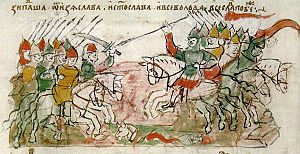Battle on the river Nemiga
| Battle on the Nemiga River | |||||||
|---|---|---|---|---|---|---|---|
 |
|||||||
|
|||||||
| Belligerents | |||||||
| Principality of Polotsk |
Principality of Kiev Principality of Chernigov Principality of Pereiaslavl' |
||||||
| Commanders and leaders | |||||||
| Vseslav of Polotsk |
Izyaslav of Kiev Svyatoslav of Chernigov Vsevolod of Pereyaslavl' |
||||||
The Battle on the Nemiga River (Belarusian: Бітва на Нямізе, Russian: Сраже́ние на Неми́ге) was a battle of the Kievan Rus' feudal period that occurred on March 3, 1067 on the Niamiha River. The description of the battle is the first reference to Minsk in the chronicles of Belarusian history.
At the end of the tenth century, Prince Vladimir Svyatoslavich, then ruling over Novgorod the Great, proposed a marriage between himself and the daughter of Rogvolod, the prince of Polotsk, who had rebuffed him, saying she did not want to take off the shoes of a slave's son. In retaliation, Vladimir attacked and pillaged Polotsk, killed Rogvolod, and took his daughter Rogneda by force, adding the city to his territorial possessions. He placed his son, Izyaslav, in Polotsk. Iziaslav's son, Bryachislav of Polotsk, succeeded his father in 1001.
By 1021, Bryacheslav set his sights on Novgorod; he attacked and ransacked the city, but on the journey home, he was overtaken by Vladimir's son Yaroslav I the Wise, then ruling in Novgorod, on the banks of the Sudoma River; he was defeated and fled, leaving behind his Novgorodian captives and loot. Yaroslav pursued him and forced Bryachislav to make peace the following year, after which the Polotsk prince settled down. After Bryacheslav's death in 1044, his son Vseslav succeeded him as Prince of Polotsk. While his father had been an irritant to the Rus princes in the Middle Dnieper region, Vseslav's campaigns in the north were much more serious. He unsuccessfully besieged Pskov in 1065, but the following year he drove out the young Novgoroidan prince Mstislav Izyaslavich, son of the Grand Prince of Kiev Izyaslav Yaroslavich, and pillaged Novgorod again. The seizure of Novgorod not only was a personal insult to the grand prince, whose son fled back to Kiev, but it threatened the Middle Dnieper princes' ties to the north – to Scandinavia, the Baltic, and tribute from the north. It also threatened the political power of the Yaroslavichi, the sons of Yaroslav the Wise, who had to that point been preeminent.
...
Wikipedia
